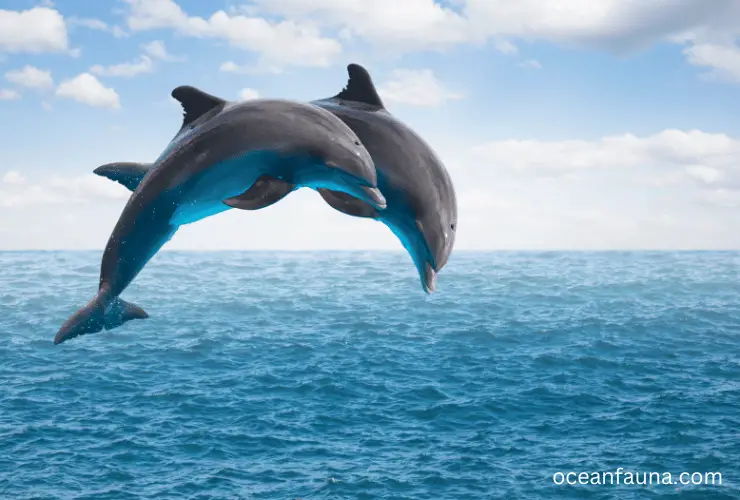Dolphins don’t sweat because they inhibit water and lack sweat glands. Instead, they use the water around them as a thermostat.
But still, people have different queries regarding the issue of whether dolphins sweat or not.
Do Dolphins Sweat?
Dolphins can’t sweat. Here are details of why dolphins don’t sweat.
Dolphins lack the necessary sweat glands that are responsible for producing sweat. Unlike humans and other mammals, dolphins’ skin does not contain pores, which is a key component of sweating.
Also, dolphins inhibit in water, and the environment around them regulates their body temperature. The water serves as a thermostat, absorbing the heat from their bodies and keeping them cool. This process is known as evaporative cooling because the water evaporating off the dolphin absorbs heat and lowers its internal body temperature.
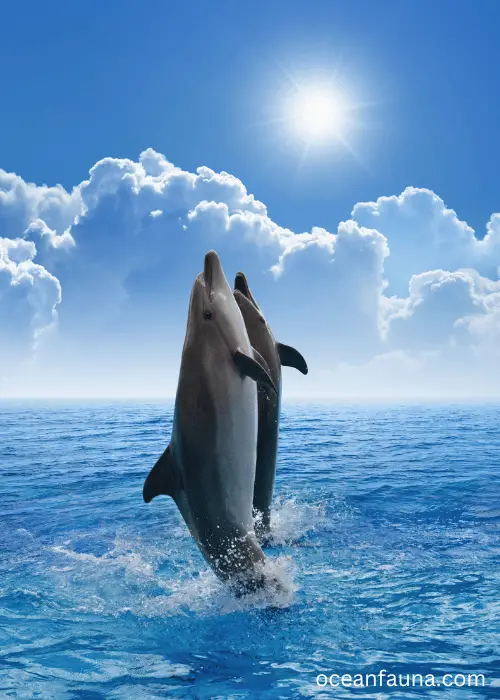
Additionally, dolphins have an insulating layer of blubber beneath their skin that helps to keep them warm in cold temperatures. This blubber also helps lower their body temperature in warmer waters by trapping coolness inside and slowing down heat absorption from the environment around them.
Furthermore, dolphins keep cool by using their fins to fan themselves with water or air. By doing so, they create more surface area for evaporative cooling on the skin’s surface and regulate their own body temperatures more efficiently than other mammals do with sweat glands.
Therefore, due to their unique physiology and aquatic lifestyle, dolphins cannot use sweating to regulate their body temperature like land mammals do because they simply lack the necessary sweat glands.
Can Dolphins Dry Out?
Yes, dolphins can dry out if they remain out of water for an extended period of time. Dolphins are mammals, and their body is covered with a layer of insulating fat, so without water, their body can be exposed to direct sunlight and the environment.
This will cause the skin to become dehydrated faster than in water. If this happens, it can cause severe skin problems such as sunburns, cuts, abrasions, and cracks due to dehydration.
In addition, dolphins cannot sweat like humans to cool down in hot weather, which makes it even more difficult for them to cope with the heat when not in water.
Moreover, dolphins’ breathing rate goes up outside of water, leading to water loss from exhalation and evaporation. When they stay in the air too long, they are at risk of drying out, which can be fatal if not addressed quickly enough by getting them back into the water.
Why Do Dolphins Have to Stay Wet?
Dolphins have to stay wet in order to survive. Firstly, their skin is covered with a greasy layer of oil that helps them move easily through the water and keeps them from drying out. This also helps protect its body from parasites and other organisms that could harm it.
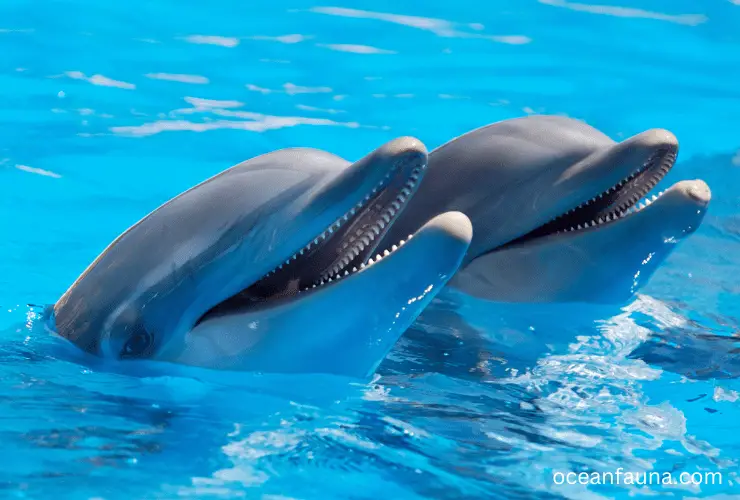
Secondly, being purely aquatic animals, dolphins must be in the water at all times to remain hydrated. Without regular access to freshwater or saltwater, dolphins cannot survive long periods on land because they are unable to drink or find food there.
Furthermore, the majority of a dolphin’s respiratory functions occur underwater. They breathe through the blowhole located on the top of their head and use their skin and mucous membranes to absorb oxygen directly from the water as they swim around. This means that if they were stranded on land for too long, not only would they experience dehydration but also suffocate due to lack of oxygen.
Additionally, dolphins rely on the water pressure around them while swimming in order to support most of their body weight and prevent strain on their internal organs. This is why when put up onto land for too long can lead to death due to organ failure caused by the immense pressure placed upon these parts of the body without any external support or buoyancy provided by the water.
All in all, dolphins need to stay wet for multiple survival reasons, such as protecting themselves from dehydration and parasites, as well as being able to breathe properly in order for them to live happily within any given marine environment.
Do Dolphins Get Hot?
Yes, dolphins do get hot. They are able to generate their own heat and maintain a stable body temperature through a process known as endothermy. This allows them to survive in cold ocean environments despite the fluctuating temperatures of this kind of environment.
Dolphins have the ability to regulate their body temperature internally, much like humans do. To achieve this, they have an insulating layer of blubber beneath their skin that helps retain internal heat. Like most other mammals, dolphins also shiver when they’re cold in order to generate additional heat by increasing their metabolism rate and muscle activity.
By maintaining a consistent core body temperature ranging from 10°C (50°F) to 30°C (86°F), dolphins can swim freely without having to worry about overheating or hypothermia.
Dolphins are able to release excess heat through sweating and to pant, as well as by flushing blood near the surface of their skin; this allows them to keep cool when temperatures in the surrounding environment rise too high.
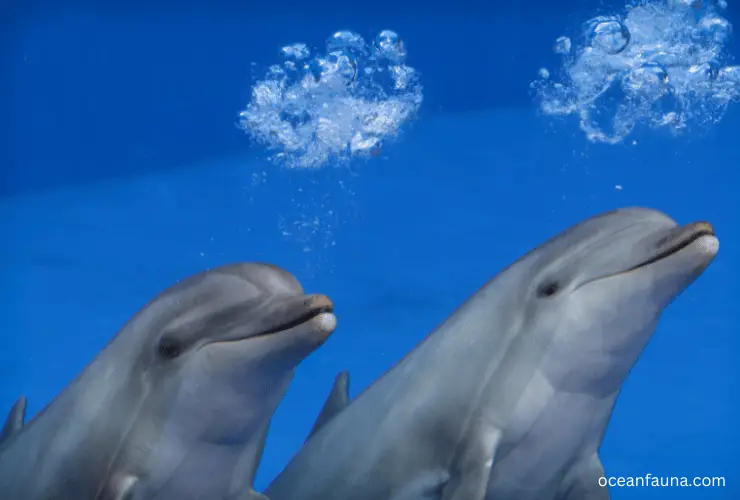
However, due to the fact that dolphins can only regulate their own body temperatures within a relatively small range of temperatures, they can still become uncomfortably hot if exposed to extreme environmental conditions such as those created by global warming or other anthropogenic activities.
The ability of dolphins to regulate their internal temperature is essential for their survival and well-being; it keeps them healthy and enables them to remain active despite changes in the external environment.
How Can Dolphins Be Affected Without Sweating?
Dolphins not having the ability to sweat has a positive impact on their lives. As they cannot lose salt in this manner, they can remain hydrated even in hot weather and during long dives into deep waters, which would otherwise pose a risk of dehydration.
This also allows them to conserve energy and maintain a stable body temperature regardless of the environment and reduce their need for energy-intensive drinking processes.
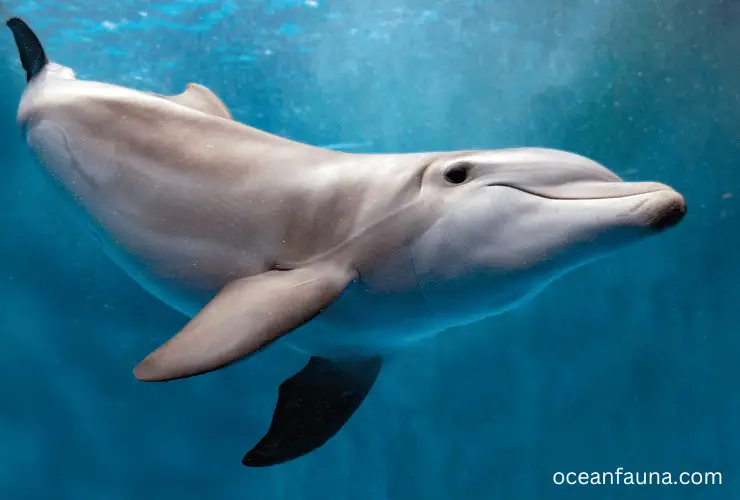
Additionally, dolphins lack sweat glands means that they are more protected from external parasites and irritants such as sand or dust that may be carried by sweat droplets, reducing their risk of infection.
Furthermore, without needing to stop for frequent drinks or sweating, dolphins can remain active for longer periods of time and, therefore, can engage in more activities than their fellow marine mammals with access to freshwater sources.
Therefore, the lack of sweat glands offers many advantages for dolphins, enabling them to move freely without worrying about dehydration in an aquatic environment.
Conclusion
Dolphins must remain submerged in order to survive and thrive. They rely on their surroundings to be hydrated, breathe, and regulate their body temperature. This is why it is critical that we take action to ensure that our oceans are healthy and clean for the dolphins who live in them.
Dolphins do not have sweat glands, which gives them various advantages, including the capacity to preserve energy, stay hydrated, and stay active for longer periods of time. For these reasons, we must act to conserve our oceans in order to ensure the survival of these unique marine mammals.

